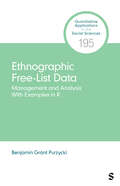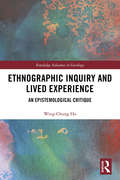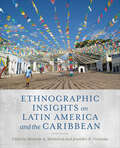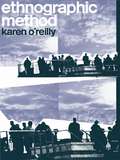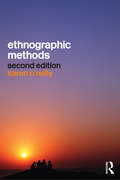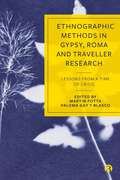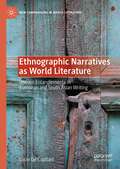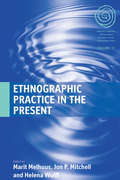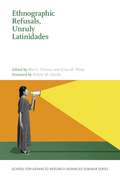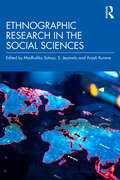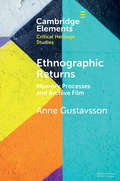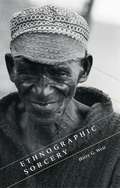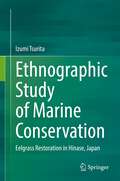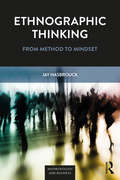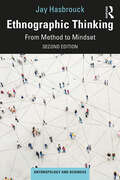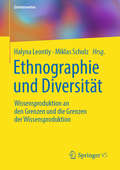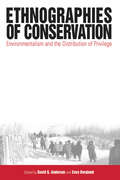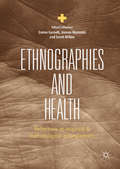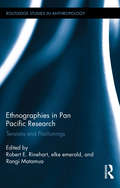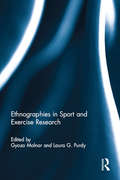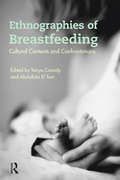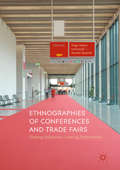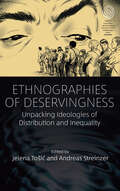- Table View
- List View
Ethnographic Free-List Data: Management and Analysis With Examples in R (Quantitative Applications in the Social Sciences)
by Benjamin Grant PurzyckiEthnographic Free-List Data: Management and Analysis With Examples in R details a method that involves research participants listing what they know or think about the researcher’s topic of interest. While researchers typically report these free-list analyses in isolation, this book incorporates them with other analytical methods and demonstrates how ethnographic free-lists can be useful to a broad social science audience. The first half of the book covers descriptive methods, and the second half incorporates insights from the early chapters into a predictive statistical framework. Author Benjamin Grant Purzycki explains how to collect, clean, and manage free-list data and how to use R to calculate and visualize the data.
Ethnographic Inquiry and Lived Experience: An Epistemological Critique (Routledge Advances in Sociology)
by Wing-Chung HoHo addresses two fundamental theoretical questions about how best to practice ethnographic inquiries to obtain qualitative, experience-near, and shareable accounts of human living. The first question is regarding the epistemology of ethnography. Ho posits that writing is epistemologically prior to the researcher’s fieldwork experience in the production of ethnographic knowledge. This stance is developed using the theories of hermeneutics put forward by Paul Ricoeur and Hans-Georg Gadamer who both consider that once a text is produced, its meaning is dissociated from the intention of the author. The second question is: what is the putative object that the ethnographer writes about? Ho argues that "lived experience" (Erlebnis) offers such an ethnographic object. Since the lived experience that an ethnographer experiences during fieldwork cannot be studied directly, further theorizations of lived experience are necessary. Ho underscores both the non-discursivity and transcendence of lived experience in the lifeworld, and the way power is clandestinely imbued in everyday life in shaping subjectivity and practice. This theorization brings together Alfred Schutz’s lifeworld theory and Michel Foucault’s power/knowledge nexus. The result is a general theory of experience that is pertinent for ethnographic inquiries. By addressing these two fundamental questions and offering novel angles from which to answer them, this book offers refreshed epistemological guidelines for conducting ethnographic research for scientific reasoning. More importantly, this book also provides a crucial knowledge base for comprehending the current epistemological debates inherent in the production of ethnographic knowledge and furthering discussions in the field.
Ethnographic Insights on Latin America and the Caribbean
by Melanie A. Medeiros Jennifer R. GuzmánEthnographic Insights on Latin America and the Caribbean offers a compelling introduction to the region by providing a series of ethnographic case studies that examine the most pressing issues communities are facing today. These case studies address key topics such as inequities during the COVID-19 pandemic, anti-Black racism, resistance against extractive industries, migration and transnational families, revitalization of Indigenous languages, art and solidarity in the wake of political violence, resilience in the face of climate change, and recent social movements. Designed for courses in a variety of disciplines, this expansive volume is organized in thematic sections, with introductions that draw important connections between chapters. The first section provides essential background on ethnography, archaeology, and history, while chapters in the following sections center local perspectives, strategies, and voices. Each chapter ends with reflection and discussion questions, key concepts with definitions, and resources to explore further. Presenting a snapshot of life during the early decades of the twenty-first century, Ethnographic Insights on Latin America and the Caribbean illuminates the structural forces and human agency that are determining the future of the region and the world.
Ethnographic Methods
by Karen O'Reilly<p>Ethnography isn't a prescribed set of methods - it's a methodology that acknowledges the complexity of human experience and the need to research it by close and sustained observation of human behaviour. In this comprehensive, yet concise introduction, Karen O'Reilly introduces the reader to the technical, practical and philosophical issues that arise when employing traditional and innovative research methods in relation to human agents. She invites the reader to engage in reflexive and creative research that draws critically and creatively from the full range of qualitative methods. <p>Using case studies of students' work to illustrate the dilemmas and resolutions that an ethnographic researcher may encounter, this textbook guides the reader from the initial design and planning stages through to the analysis and writing-up. It explores the historical and philosophical foundations of ethnographic research and goes on to cover a range of relevant topics such as participant observation, qualitative interviews, (focus) group interviews and visual data collection and analysis. <p>Designed primarily for undergraduates, this book incorporates complex methodological debates which will also engage more experienced researchers, perhaps coming to ethnography for the first time.</p>
Ethnographic Methods
by Karen O'ReillyThis new edition of Karen O’Reilly’s popular Ethnographic Methods provides a comprehensive and accessible introduction to the technical, practical and philosophical issues that arise when employing traditional and innovative research methods in relation to human agents. Using a wide range of case studies and source material to illustrate the dilemmas and resolutions that an ethnographic researcher may encounter, this textbook guides the reader from the initial design and planning stages through to the analysis and writing-up. It explores the historical and philosophical foundations of ethnographic research and goes on to cover a range of relevant topics such as participant observation, qualitative interviews, (focus) group interviews and visual data collection and analysis. Having been substantially revised and updated, the second edition includes new discussions of emerging practices such as reflexive ethnography and autoethnographic accounts, as well as an entire chapter dedicated to new directions in the field – including virtual, mobile, multi-sited and global ethnography.
Ethnographic Methods in Gypsy, Roma and Traveller Research: Lessons from a Time of Crisis
by Martin Fotta and Paloma Gay y BlascoEPDF and EPUB available Open Access under CC-BY-NC-ND licence. This collection scrutinizes the methodological and ethical challenges that researchers face when working with and for Gypsy, Roma and Traveller communities in the context of global crises. Contributors assess the impact of the pandemic on their engaged research, evaluating novel methods and technologies. They reveal how current research practice blurs the borders between activism and scholarship, and they argue the need for innovative collaborations with local communities. Showcasing emerging aspects of GRT-related scholarship, this book makes a key contribution to larger debates on the positionality of researchers and the politics of research, and affirms the continued value of rigorous ethnography.
Ethnographic Narratives as World Literature: Uneven Entanglements in European and South Asian Writing (New Comparisons in World Literature)
by Lucio De CapitaniThis book links world-literary studies with anthropology and ethnography. It shows how ethnographic narratives can represent a compelling point of departure for world-literary explorations. The volume compares the travel writing and fiction of Robert Louis Stevenson and Rudyard Kipling as colonial ethnographic narratives; the militant writings of Carlo Levi and Mahasweta Devi; and the travelogues and ethnographic fiction of Amitav Ghosh and the literary journalism of Frank Westerman. Each of these readings focuses on a set of social, political and historical circumstances and relies on a dialogue with anthropological theory and history. This book demonstrates how imperialism, colonialism, capitalism and ecology are interdependent, and contributes to methodological debates within both anthropology and world-literary studies.
Ethnographic Practice In The Present
by Jon P. Mitchell Marit Melhuus Helena WulffIn its assessment of the current "state of play" of ethnographic practice in social anthropology, this volume explores the challenges that changing social forms and changing understandings of "the field" pose to contemporary ethnographic methods. These challenges include the implications of the remarkable impact social anthropology is having on neighboring disciplines such as history, sociology, cultural studies, human geography and linguistics, as well as the potential 'costs' of this success for the discipline. Contributors also discuss how the ethnographic method is influenced by current institutional contexts and historical "traditions" across a range of settings. Here ethnography is featured less as a methodological "tool-box" or technique but rather as a subject on which to reflect.
Ethnographic Refusals, Unruly Latinidades (School for Advanced Research Advanced Seminar Series)
by Alex E. Chávez and Gina M. PérezThe contributors in Ethnographic Refusals, Unruly Latinidades highlight the value of &“radical inclusion&” in their research and call for a critical self-reflexivity that marshals the power of bearing witness to move from rhetoric to praxis in support of these methodologies within anthropological perspectives. The essays in this collection do not offer simple solutions to histories of colonialism, patriarchy, and misogyny through which gender binaries and racial hierarches have been imposed and reproduced, but rather provide a crucial opportunity for reflection on and continued reimagination of the contours of Latinidad. These scholars deploy Latinx strategically as part of ongoing dialogues, understanding that their terminologies are inherently imprecise, contested, and constantly shifting. Each chapter explores how Latinx ethnographers and interlocutors work together in contexts of refusal—ever mindful of how power shapes these encounters and the analyses that emerge from them—as well as the extraordinary possibilities offered by ethnography and its role in ongoing social transformation.
Ethnographic Research in the Social Sciences
by Madhulika Sahoo S. Jeyavelu Anjali KuraneThis book is an essential guide to scientifically conducting contemporary ethnographic research at undergraduate, postgraduate, and doctoral levels in the social sciences, the humanities, and business studies. It addresses the methodological challenges of ethnographic research across the social sciences and highlights present time research areas, including digital ethnography, artificial intelligence, classroom pedagogy, hybrid organization, and many more. This volume is divided into three parts and can be a single source of reference that— • Guides students through essential theoretical and conceptual aspects of ethnography; • Demonstrates the usage of ethnography in allied disciplines—psychology, healthcare, international border studies, linguistic, artificial intelligence, and organizational behaviour; • Demonstrates the application of ethnographic research in the field; • Presents valuable lessons from fieldwork experiences by different scholars across a variety of communities; • Includes dos and don’ts for early career and first-time researchers. A step-by-step guide with student-friendly text, this book will be an essential supplementary reading across the social sciences and the humanities, especially for those conducting fieldwork in the Global South.
Ethnographic Returns: Memory Processes and Archive Film (Elements in Critical Heritage Studies)
by Anne GustavssonIn the past decades cultural heritage stored at museums and archives has been returned to source communities in various forms and under diverse circumstances. This contribution to the Elements series explores and discusses specifically the return of digital 'ethnographic' images to indigenous and non indigenous people that share a common recent history of coexistence and dispute over the same territory that is to be understood in the light of the consolidation of a Nation State with a settler colonial logic. The author argues that the affective reception of what a given archive labels as tangible and intangible heritage varies according to each audience´s particular memory practices, historical experience and way of relating to shared hegemonic notions of 'whiteness' and 'indigeneity'.
Ethnographic Sorcery
by Harry G. WestAccording to the people of the Mueda plateau in northern Mozambique, sorcerers remake the world by asserting the authority of their own imaginative visions of it. While conducting research among these Muedans, anthropologist Harry G. West made a revealing discovery---for many of them, West's efforts to elaborate an ethnographic vision of their world was itself a form of sorcery. In Ethnographic Sorcery, West explores the fascinating issues provoked by this equation. A key theme of West's research into sorcery is that one sorcerer's claims can be challenged or reversed by other sorcerers. After West's attempt to construct a metaphorical interpretation of Muedan assertions that the lions prowling their villages are fabricated by sorcerers is disputed by his Muedan research collaborators, West realized that ethnography and sorcery indeed have much in common. Rather than abandoning ethnography, West draws inspiration from this connection, arguing that anthropologists, along with the people they study, can scarcely avoid interpreting the world they inhabit, and that we are all, inescapably, ethnographic sorcerers.
Ethnographic Study of Marine Conservation: Eelgrass Restoration in Hinase, Japan
by Izumi TsuritaThis book explores the nature of marine conservation based on the case study of Hinase, a fishing village in Okayama, Japan. It focuses on the fishers’ self-motivated eelgrass restoration activity which has been continued for more than 30 years. This activity in Hinase recently attracted international attention as a case under the name “Satoumi” and “Marine Protected Areas” in several governmental reports, but detailed information, such as the historical background and social structure of Hinase, has not yet been analyzed. This book, therefore, fulfills this gap by providing its ethnographic information. In addition, this book offers some points for critical thinking by concluding that marine conservation activities cannot always be evaluated or arranged under the standardized approach with limited time and space. This viewpoint reaffirms the importance of local initiative and highlights the value of qualitative research to seek the way forward for promising marine conservation. This book is suitable for an academic audience in the field of social sciences, such as applied anthropology, as well as ecologists, government officials, environmentalists, and citizens who are interested or engaged in environmental issues or natural resource management.
Ethnographic Thinking: From Method to Mindset (Anthropology & Business)
by Jay HasbrouckThis book argues that ‘ethnographic thinking’—the thought processes and patterns ethnographers develop through their practice—offers companies and organizations the cultural insights they need to develop fully-informed strategies. Using real world examples, Hasbrouck demonstrates how shifting the value of ethnography from simply identifying consumer needs to driving a more holistic understanding of a company or organization can help it benefit from a deeper understanding of the dynamic and interactive cultural contexts of its offerings. In doing so, he argues that such an approach can also enhance the strategic value of their work by helping them increase appreciation for openness and exploration, hone interpretive skills, and cultivate holistic thinking, in order to broaden perspectives, challenge assumptions, and cross-pollinate ideas between differing viewpoints.Ethnographic Thinking is key reading for managers and strategists specifically wishing to tap-into the potential that ethnography offers, as well as those searching more broadly for new ways to innovate practice. It is essential reading for students of applied ethnography, and recommended for scholars too.
Ethnographic Thinking: From Method to Mindset (Anthropology & Business)
by Jay HasbrouckThis second edition of Ethnographic Thinking: From Method to Mindset serves as a primer for practitioners who want to apply ethnography to real-world challenges and commercial ventures. Building on the first edition, each chapter now includes a section focusing on practical advice to help readers activate key insights in their work.The book’s premise — that the thought processes and patterns ethnographers develop through their practice have strategic value beyond consumer insights — remains the same. Using real-world examples, Hasbrouck demonstrates how a more holistic view of an organization can help it benefit from a deeper understanding of its offerings within dynamic cultural contexts. In doing so, he argues that ethnographic thinking helps organizations increase appreciation for openness and exploration, hone interpretive skills, and cultivate holistic thinking; allowing them to broaden perspectives, challenge assumptions, and cross-pollinate ideas between differing viewpoints.Ethnographic Thinking: From Method to Mindset is essential reading for managers and strategists who want to tap into the full potential that an ethnographic perspective offers, as well as those searching more broadly for new ways to innovate. It will also be of value to students and practitioners of applied ethnography, as well as professionals who would like to optimize the value of ethnographic thinking in their organizations.
Ethnographie und Diversität: Wissensproduktion an den Grenzen und die Grenzen der Wissensproduktion (Erlebniswelten)
by Halyna Leontiy Miklas SchulzIm Mittelpunkt des Bandes steht die ethnografisch orientierte Forschungspraxis. Sie wird im Spiegel der in den Kultur- und Sozialwissenschaften aktuell kontrovers verhandelten Konzepte Diversität und Intersektionalität reflektiert. Besondere Aufmerksamkeit wird der Frage gewidmet, wie Forschende mit dem methodischen Problem der Produktion, Reproduktion und Reflexion von Kategorien umgehen. Welche Kategorien werden schon an das ‚Feld‘ herangetragen, später revidiert oder verfestigt und welche Kategorien begleiten schließlich den Interpretationsprozess und welche konstituieren die Ergebnisdarstellung? Wie und warum entstehen sie? Und nicht zuletzt: Wie werden durch (Forschungs-)Kategorien spezifische Erlebniswelten menschlicher Vielfalt mit hervorgebracht oder transformiert?Der InhaltKonzeptionelle Grundlagen • Diversität und Inklusion in Bildungskontexten • Interkultur in der Diversität • Diversität im Spannungsfeld von Körper, Geschlecht und BehinderungDie HerausgebendenDr. Halyna Leontiy ist Wissenschaftliche Mitarbeiterin am Zentrum für Gender- und Diversitätsforschung (ZGD) an der Universität Tübingen und seit November 2019 Gastwissenschaftlerin am Interdisziplinären Zentrum für Integrations- und Migrationsforschung (InZentIM) der Universität Duisburg-Essen.Dr. phil. Miklas Schulz vertritt seit dem Sommersemester 2019 die Professur Inklusive Pädagogik und Diversität am Institut für Erziehungswissenschaft der Universität Duisburg-Essen und ist Wissenschaftlicher Mitarbeiter (beurlaubt) am Institut für Sonderpädagogik an der Leibniz Universität Hannover.
Ethnographies Of Conservation
by David G. AndersonAnthropologists know that conservation often disempowers already under-privileged groups, and that it also fails to protect environments. Through a series of ethnographic studies, this book argues that the real problem is not the disappearance of "pristine nature" or even the land-use practices of uneducated people. Rather, what we know about culturally determined patterns of consumption, production and unequal distribution, suggests that critical attention would be better turned on discourses of "primitiveness" and "pristine nature" so prevalent within conservation ideology, and on the historically formed power and exchange relationships that they help perpetuate.
Ethnographies and Health: Reflections on Empirical and Methodological Entanglements
by Emma Garnett Joanna Reynolds Sarah MiltonThis edited collection explores the multiple ways in which ethnography and health emerge and take form through the research process. There is now a plethora of disciplinary engagements with ethnography around the topic of health, including anthropology, sociology, geography, science and technology studies, and in health care professions such as nursing and occupational therapy. This dynamic and evolving landscape means ethnography and health are entangled in new and different ways, providing a timely opportunity to explore what these entanglements do and affect in the social production of knowledge. Rather than discussing the strengths (and limitations) of ethnography for engaging with health, the book asks: what does ethnography enable, make visible and possible for knowing and doing health in contemporary research settings and beyond?
Ethnographies in Pan Pacific Research: Tensions and Positionings (Routledge Studies in Anthropology #22)
by Elke Emerald Robert E. Rinehart Rangi MatamuaThe book is about exciting ethnographic happenings in the vibrant and growing global interface which includes Australia, New Zealand, and some of the Asian geographical regions, as well as - more broadly - the global South. It explores ethnographic writing as culture(s) (re)produced, positionalities of authors, tensions between authors and others, multi-faceted groups, and as co-productions of these works. The contributors describe and discuss a variety of topical areas of interest, from Facebook to memory work, from children's sexuality to urban racism, from meanings of Indigenous knowledge to how communities can come together to retain what is valuable to themselves. The authors also manage to locate themselves and others (positionings) in the research hierarchies (tensions). This is a valuable guide to the effects of 21st-century ethnography on the qualitative research project.
Ethnographies in Sport and Exercise Research
by Gyozo Molnar Laura PurdyEthnography has become an important method for researching and interpreting the social world, not least in the field of sport and exercise studies. Ethnographies in Sport and Exercise Research is the first book to provide a contemporary overview of the current state of ethnographic research and its application within sport and exercise, introducing and explaining a range of well-established and emerging ethnographic approaches. Featuring a heavyweight line-up of sport and exercise researchers, the book is divided into three parts. The first considers the methodological and theoretical aspects of ethnographic research, including: a history of ethnography in sport and exercise research the definition of the ethnographic field methods of gathering ethnographic data methods of representing ethnographic research. In the second part of the book, a series of chapter-length case studies, spanning sports from boxing to fell running and themes from gender to fandom, demonstrate the challenges and rewards of ethnographic research in the context of sport and exercise, helping students and researchers to develop a solid understanding of qualitative research at both a theoretical and a practical level. The final part of the book considers future directions for ethnographic research, including an evaluation of its place in the expanding field of study in sport management. A comprehensive assessment of the statement of ethnographic research in sport, Ethnographies in Sport and Exercise Research is invaluable reading for any research methods course taken as part of a degree programme in sport and exercise, and a useful reference for all active researchers.
Ethnographies of Breastfeeding: Cultural Contexts and Confrontations (Criminal Practice Ser.)
by Tanya Cassidy Abdullahi El TomBreastfeeding is an intimate and deeply rooted bodily practice, as well as a highly controversial sociocultural process which invokes strong reactions from advocates and opponents. Touching on a wide range of issues such as reproduction, sexuality, power and resources, and maternal and infant health, the controversies and cultural complexities underlying breastfeeding are immense.Ethnographies of Breastfeeding features the latest research on the topic. Some of the leading scholars in the field explore variations in breastfeeding practices from around the world. Based on empirical work in areas such as Brazil, West Africa, Darfur, Ireland, Italy, France, the UK and the US, they examine the cross-cultural challenges facing mothers feeding their infants.Reframing the traditional nature/culture debate, the book moves beyond existing approaches to consider themes such as surrogacy, the risk of milk banks, mother-to-mother sharing networks facilitated by social media, and the increasing bio-medicalization of breast milk, which is leading its transformation from process to product. A highly important contribution to global debates on breast milk and breastfeeding.
Ethnographies of Conferences and Trade Fairs
by Hege Høyer Leivestad Anette NyqvistThis anthology is an attempt to make sense of conferences and trade fairs as phenomena in contemporary society. The authors describe how these large-scale professional gatherings have become key sites for making and negotiating both industries and individual professions. In fact, during the past few decades, conferences and trade fairs have become a significant global industry in their own right. The editors assert that large-scale professional gatherings are remarkable events that require deeper analysis and scholarly attention.
Ethnographies of Deservingness: Unpacking Ideologies of Distribution and Inequality (EASA Series #45)
by Jelena Tošić Andreas StreinzerClaims around 'who deserves what and why' moralise inequality in the current global context of unprecedented wealth and its ever more selective distribution. Ethnographies of Deservingness explores this seeming paradox and the role of moralized assessments of distribution by reconnecting disparate discussions in the anthropology of migration, economic anthropology and political anthropology. This edited collection provides a novel and systematic conceptualization of Deservingness and shows how it can serve as a prime and integrative conceptual prism to ethnographically explore transforming welfare states, regimes of migration, as well as capitalist social reproduction and relations at large.
Ethnographies of Deservingness: Unpacking Ideologies of Distribution and Inequality (EASA Series #45)
by Jelena Tošić and Andreas StreinzerClaims around 'who deserves what and why' moralise inequality in the current global context of unprecedented wealth and its ever more selective distribution. Ethnographies of Deservingness explores this seeming paradox and the role of moralized assessments of distribution by reconnecting disparate discussions in the anthropology of migration, economic anthropology and political anthropology. This edited collection provides a novel and systematic conceptualization of Deservingness and shows how it can serve as a prime and integrative conceptual prism to ethnographically explore transforming welfare states, regimes of migration, as well as capitalist social reproduction and relations at large.
Ethnographies of Development and Globalization in the Philippines: Emergent Socialities and the Governing of Precarity (Routledge Contemporary Southeast Asia Series)
by Koki SekiThe contributors to this volume examine the actual workings and on-the-ground effects of contemporary political economic shifts in the Global South, and implications for reconfiguring social networks, conceptions and practices of governance, and burgeoning social movements. How do various groups in the Global South respond to and manage chronic states of insecurity and precarity concomitant with contemporary globalization processes? While drawing on diverse ethnographic viewpoints in the Philippines, the authors analyze the impact of these processes through the conceptual framework of "emergent sociality," a purported connectedness among individuals fostered through interactions, copresence, and conviviality within a community over a long duration. In so doing, the case studies in this volume suggest, illuminate, and debate insecurities that may be commonly shared among populations in the Philippines and throughout the Global South. This anthology will be of great interest to students and scholars of cultural anthropology, globalization and Philippines society.
